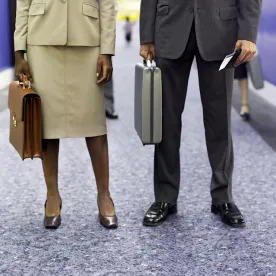On February 27, 2015, the appellate court reversed the circuit court’s finding of non-compensability where a traveling employee simply tripped over a curb. In Nee v. Illinois Workers’ Compensation Comm’n, 2015 IL App (1st) 132609WC, the claimant was a plumbing inspector for the City of Chicago who inspected approximately 5-7 sites per day. Nee, 2015 IL App (1st) 132609WC. On July 27, 2009, after completing an inspection, he tripped on a curb and fell while walking back to his car. Initially, the claimant testified that the curb may have been higher than the sidewalk, but he later acknowledged on cross examination that he did not know if it was higher or cracked. As a result of the occurrence, the claimant suffered a medial collateral ligament strain in the knee.
At arbitration, the claimant’s injuries were found to have arisen out of and “in the course of” his employment. On review, the Commission reversed and found unanimously that the claimant failed to prove that he sustained accidental injuries “arising out of” and “in the course of” his employment. The circuit court confirmed the commission decision.
On appeal, the appellate court held that the Commission’s decision was against the manifest weight of the evidence. The appellate court began its analysis by concluding that the risk presented by the curb was a neutral risk and as such, it would not be compensable unless the employee was exposed to the risk to a greater degree than the general public. The court found nothing in the record to suggest that some aspect of the claimant’s employment contributed to the risk of traversing a curb. It noted that although there was evidence he was carrying a clipboard, there was no evidence presented that this caused or contributed to his trip and fall.
The court therefore proceeded to analyze the case in terms of whether, as a traveling employee, the claimant was exposed to a risk of tripping on a curb more frequently than the general public. The court acknowledged that the risk of tripping over a curb is a risk to which the general public is also exposed. It noted, however, that under the Street Risk Doctrine, the risk of injury associated with the street becomes a risk of employment for traveling employees. The court stated that “when a traveling employee, such as the claimant in this case, is exposed to the risk while working, he is presumed to have been exposed to a greater degree than the general public.” The court therefore concluded that as a traveling employee, the claimant was subjected to an increased risk of tripping over the curb and therefore, his injury “arose out of” his employment. The Nee case illustrates the distinct analysis that must be undertaken when determining whether a traveling employee’s injury “arises out of” and “in the course of” their employment. Cases which at first blush appear noncompensable may very well be found compensable where they involve claimants deemed traveling employees. In Nee, the court noted that traveling employee cases are governed by different rules than are applicable to other claimants, but noted that the claimant still has the burden of proving that his injury “arose out of” his employment. The test for determining whether an injury to a traveling employee “arises out of” and “in the course of” employment is the reasonableness of the conduct in which the employee was engaged and whether it might normally be anticipated or foreseen by the employer. In most instances, the mere act of stepping over a curb would not make for a compensable claim where the curb does not, itself, present a defect or increased risk. Traveling employees, however, are deemed at increased risk by virtue of injuries that occur while exposed to “street risk.”




 />i
/>i
